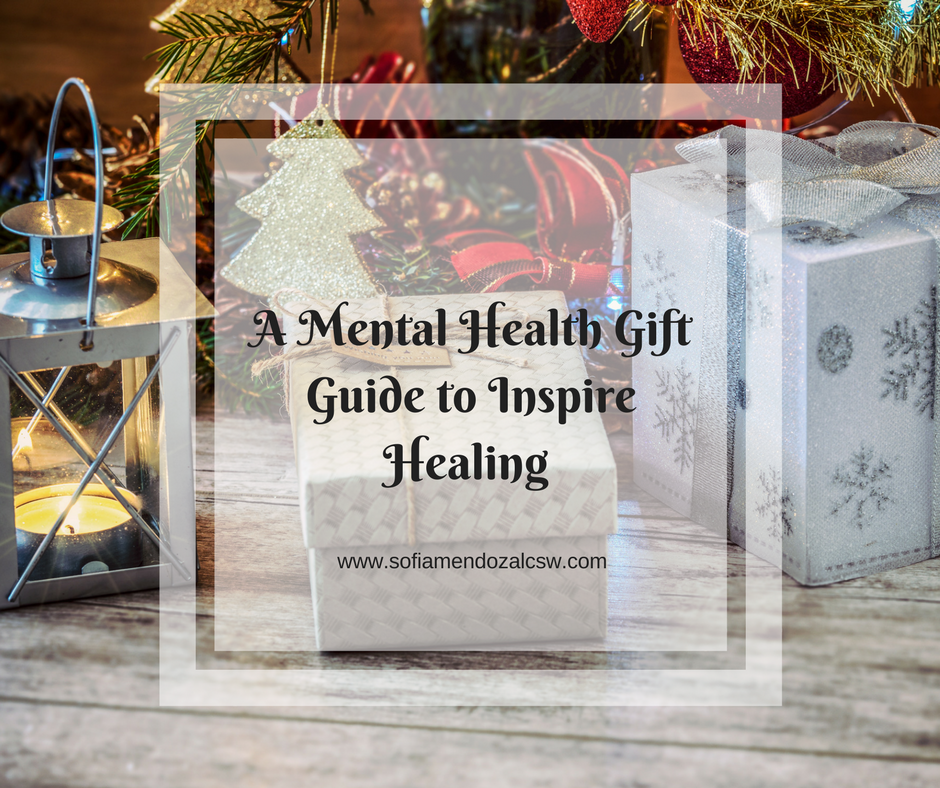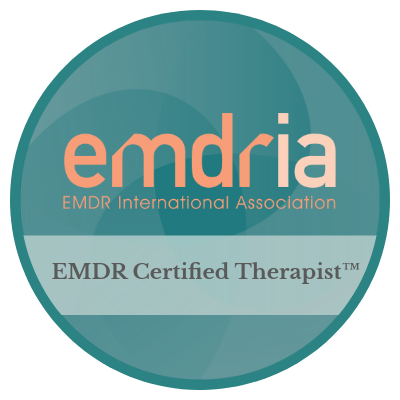by Sofia Mendoza, LCSW
It’s officially the holidays and with that can come with gift giving, stress and trauma triggers for many. Since the holidays can trigger painful memories and emotions for many, I always recommend finding things to soothe with during this difficult time. While it’s hard to be going through the difficult time, it’s also hard on the loved one who is concerned and doesn’t know how to help.
Aside from recommending professional help for yourself or a loved one (this is always my #1 recommendation), I’ve put together a mental health gift guide. Many of these items are great tools for healing and inspiring awareness, self-care, and self-compassion when we need it the most. I’ve also included links (note: many of these links are amazon affiliate links. See disclosure statement below) to my favorite books that have aided in the healing process of many individuals I’ve come across, including myself. You can buy these gifts for others, but also for yourself!
1. Gratitude Journals. Studies show that expressing gratitude significantly aids in recovering from depressive episodes. This journal is my favorite as it’s prompts are thought provoking and easy to fill in.
2. Mindfulness Practices. Mindfulness is about being in the present moment, noticing and observing your internal process with a non-judgmental stance. Mindfulness can help us with our awareness and clarity about the chatter in the head. These are my favorite mindfulness resources.
3. To inspire career/employment ideas. People struggle with knowing what they like, how to make passions into careers, or even how to get in to certain professions. This resources can help people explore all these facets.
4. Adult coloring books. Coloring can be incredibly soothing for a lot of people. I often have clients experiment with coloring when we talk about ways to incorporate daily pleasant activities and self-care. Adult coloring books are always at the top of the list. There are so many of them with inspiring, funny and calming themes.
5. Improving Sleep. Poor sleep contributes to a host of mental health symptoms such as irritability, fatigue, emotional lability, sadness, and can be a trigger for more serious episodes.
Recent research shows promising outcomes in the use of weighted blankets to aid in improving sleep for some individuals with sensory, anxiety, and insomnia (read a 2015 study here). Be sure to do your own research or consult your (or your loved one’s) physician to discuss benefits, weight and age recommendations.
White noise machines or calming nature sounds can help with creating a soothing ambiance for sleep sufferers
6. Hope/Cope Box. A box or container of sorts can be useful in storing positive messages or items that help the individual feel connected, loved, sense of purpose, meaning, and reminders to cope. Some people call it their “emergency tool kit” or ICEE (in case of emotional emergency) Box. Fill it with your loved ones favorite self-soothing items.
7. Worry Dolls. A hallmark of anxiety is the rumination of worry that occurs and impacts important aspects of someone’s functioning. Worry dolls allow kids and adults, alike to express their worry and hand it over to this object to help with carrying the heavy burden of the worry. It might be the first step in having faith in turning over worry to a higher power, a therapist, a spiritual guide, etc. You can even try making your own instead of buying. Be creative!
8. Self-Soothing. When we can soothe by engaging our 5 senses (smell, touch, taste, hear, see), it allows us to be in the present moment while self-caring. Essential oil diffusers, hand warmers, scented candles, warm blankets, lotion all have calming qualities that help with self-soothing. Some of these items can promote sleep, which essential to mental wellness.
9. Books about Healing. These books help to become aware and start understanding vulnerability, grief, coping ideas, and can assist in inspiring healing, along with going to therapy. You can also go to my Book Recommendations page for different issues.
10. Experience Gifts. Most loved ones want to be connected to the important people in their lives. For your chronic self-neglecters, gifts that emphasize self-care and relaxation can be super helpful. Bonus points if you give an experience that you can engage in together. Keep in mind that for people suffering from depression or anxiety, they might be feeling fatigued and not up to it. Be patient with them and yourself. Don’t take it personal and assure your loved one that you will be there for them when they’re ready. Sometimes that’s all they need to hear from you.
Here are some ideas for experience gifts: Museum memberships, donation on their behalf to their favorite charity, massages/facials (Sacred Skincareapy is my go-to for facials), art/sip/wine classes, a short trip, movie tickets, restaurant gift card, spa entrance (Glen Ivy is my favorite for a Mental Health Day), homemade gift card/coupon with low cost ideas such as hiking, exercising at the beach, yoga classes, attending an outdoor craft fair.
There you have it. Ten ideas that assist in soothing, self-care, healing, and mental wellness. Do you have some favorite gifts or items that you think I should add to my list? Feel free to share in the comments.
*Disclosure statement: Please be advised that some of these links are affiliate links where I earn a commission, percentage, a big thank you or a high five when they’re purchased. Others are simply my favorite in Los Angeles County. Please note that this guide is strictly for ideas and does not replace medical and professional help. I strongly encourage that you or your loved one to engage in therapy or speak with their medical professional about any of these items. If you find yourself in a medical emergency where you or a loved one is a danger to themselves or others, you are strongly urged to call 9-1-1 or go to your nearest emergency room. The National Suicide Hotline number is: 1-800-273-TALK (8255). In Los Angeles County, you can also call the Department of Mental Health’s Psychiatric Mobile Response Team – Access Hotline at 1-800-854-7771.

































